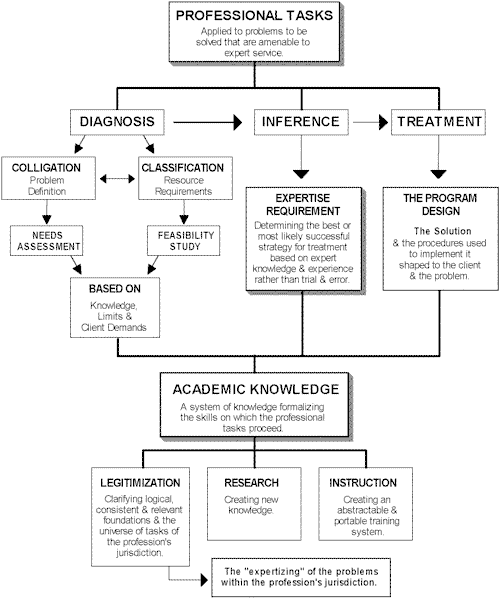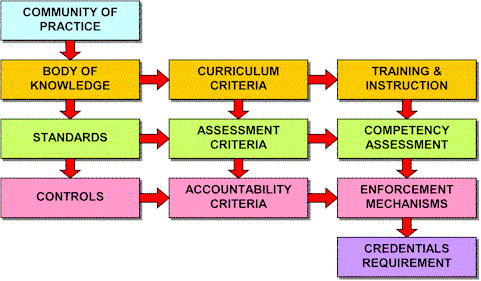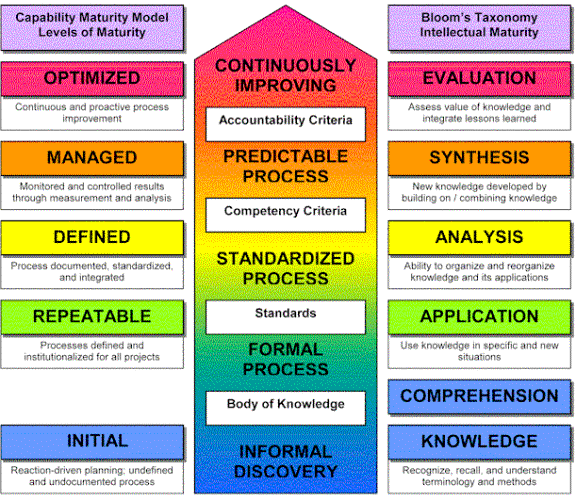|
In order to examine event management as a
profession, one must first examine the classifications of profession
versus occupation.
The National Directory of Occupational
Titles and Codes lists meeting management as an "official" profession
(Polivka, p.708), and the U.S. Department of Labor lists Meeting and Convention
Planners with the Standard Occupational Classification number 13-1121, defining
it as the coordination of activities of staff and convention personnel to make
arrangements for group meetings and conventions.
The American College Dictionary defines the
term occupation as one’s business or trade and notes that the term profession
implies an occupation requiring special knowledge and training.
Scholars studying the nature of professions
contend the designation of profession indicates a protected or exclusive
jurisdiction over an occupation that prevents those without credentials from
practicing, or at least controls their practice economically through public
opinion by describing them as amateurs (Freidson, 1986). Jurisdictions may be
based on the division of labor into interdependent parts (another potential use
for the proposed domain structure) or according to client (as illustrated within
the scope of event genre).
As illustrated in Figure 1, the definition
of a professional jurisdiction (the tasks) must be directly linked to a formal
system of knowledge that legitimizes and "expertizes" the
profession’s jurisdiction (Abbott, 1988). The linkage with education is
crucial as "a basic credential for professionals; it delineates the
foundation of their expertise." (Freidson, p. 26)
Figure
1
Abbott’s
Parameters of Professional Work

The status of event management as a
profession is in progress. The development of a profession includes defining a
body of knowledge including theory and skills; developing "good" or
"best" practice guidance standards and ethics by those working in the
occupation; disseminating these through education, training, and associated
certification or qualification programs; and sanctions imposed on the
unqualified or substandard performers, as illustrated in Figure 2.
Jurisdictional claims often begin with the private occupational licensing or
credentialing systems devised by practitioner associations (communities of
practice) to self-regulate their members and influence their client publics,
then sometimes culminating in the legal arena where governmental licensing is
mandated.
Figure
2
Model
of the Process of Professionalization

Some segments of the event management
industry have instituted portions of this model within their individual
certification programs, but all have neglected various components of the
entirety of the process, and none have addressed the control or accountability
dimension with enforceable regulations.
The statutory requirement for credentials
(academic, certification, or licensing) may never take place, but the
marketplace will eventually mandate them in some form. Internal regulation,
external validation, and perhaps external regulation will increase in importance
as globally harmonized standards of quality and best practice are sought for
conformity assessment.
Standards that may be used as the foundation
for conformity assessments, which balance regulated public protection and
heightened competition, are increasing in importance throughout the world as a
basis for facilitating international trade. Organizations such as the
International Organization for Standardization (ISO) have established standards
and processes whereby a product, process, or service is evaluated against
specified requirements. ISO 9000 standards, specifying effective quality
management systems for both manufacturing and service industries, are employed
in approximately 350,000 organizations in more than 150 countries.
Conformity assessment measures the level of
a performing organization’s system maturity. The maturity of event management
as a profession (and the sum of its performing organizations) is, as yet,
informal and inconsistent. Using the Capability Maturity Model (CMM), developed
by the Software Engineering Institute of Carnegie Mellon University at the
request of the U.S. government as a method for assessing the capabilities of
Department of Defense contractors, the maturity of the industry is still
immature and fragmented. Comparing the levels of the CMM with the levels of
intellectual behavior specified in Bloom’s Taxonomy, as illustrated in Figure
3, the hierarchy of maturity for performing organizations and individuals is
practically parallel.
Figure
3
Maturity
Models

It
must be emphasized that these levels relate to the processes
and procedures rather than the creative
product that results. And it must
be remembered that just because an event was successful does not prove it was
well managed. The processes that were employed may or may not be repeatable or
capable of being transmitted to others or transposed to a different project. It
is the process that must be quantified and
will be measured within a conformity assessment.
For
event management to attain the status as a true profession a body of knowledge
must be established; an agreed-upon scope of skill competencies necessary for
one to be considered qualified to practice must be identified; a reliable system
of formal knowledge and its transmission must be created; a consistent method
for measuring competency must be devised; and an equitable system of
accountability must be developed. Only then will this occupation warrant an exclusive
jurisdiction based on expert knowledge and experience — a legitimate
profession.
References
Abbott,
Andrew (1988). The System of Professions: An Essay on the Division of Expert
Labor, Chicago: The University of Chicago Press
Capability
Maturity Model (n.d.). Retrieved October 31, 2003 from U.S. Department of
State Web site:
http://www.state.gov/m/a/sdbu/pubs/9729.htm
Crow,
Kenneth (2000). Capability Maturity Model, DRM Associates. Retrieved
October 31, 2003 from DRM Web site:
http://www.npd-solutions.com/cmm.html
Freidson,
Eliot (1986). Professional Powers: A Study of the Institutionalization of
Formal Knowledge, Chicago: The University of Chicago Press
Global
Performance Based Standards for Project Management Personnel (2003) Working
Paper No 1: Report from Working Session 24-26 February, 2003, Lille, France.
Sydney: UTS. ISBN 0-9750645-0-9. Retrieved May 12, 2003 from http://svc148.bne092u.server-web.com/global/files/GPM_06.pdf
Jeynes,
Jacqueline (2002). Risk Management: 10 Principles, Oxford:
Butterworth-Heinemann
Krug,
Susan, ed. (2000). Convention Industry Council Manual: A Working Guide for
Effective Meetings and Conventions, 7th ed. McLean, VA: CIC
O’Toole,
William J. (2002). Competencies and Maturity Models, ISES Conference for
Professional Development, Sydney, Australia
Polivka, Edward G., ed. (1996). Professional Meeting
Management, 3
rd ed., Birmingham, Alabama: Professional Convention
Management Association
24
September 2006
William R. Host, CMP, of HOST Meetings & Events
Management and the Roosevelt University School of Hospitality & Tourism
Management passed along this announcement regarding the status of the
profession:
"It
was announced after the United Nations meetings; Expert Group on
International Economic and Social Classifications, 20-24 June 2005 and
Technical Subgroup of the Expert Group, 27-28 June 2005, that the profession
of meeting and exhibition organising has been recognised by the UN in their
"International Standard Industrial Classification of All Economic
Activities" (ISIC, Rev 4 provisional draft) as follows:
8230 Convention and trade show organisers
This class includes the organisation, promotion
and management of events such as business and trade shows, conventions,
conferences and meetings, whether or not including the management and
provision of the staff to operate the facilities in which these events take
place.
7920 Other reservation service activities
This class includes the activities of marketing,
promotion and arrangement of accommodation and other services including
tours for conventions and visitors, tourist guide services, condominium
time-share exchange services and other travel-related reservation services
(including for transportation, hotels, restaurants, car rentals,
entertainment and sport). Activities of ticket sales; theatrical sports and
all other amusement and entertainment are also included."
Retrieved July 19, 2005 from:
http://www.iccaworld.com/npps/story.cfm?ID=830
| 



